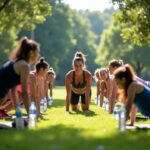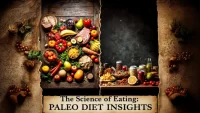Achieving your best self requires a harmonious blend of fitness and nutrition. These two elements are crucial for a healthy, balanced lifestyle. In this comprehensive guide, we will delve into 26 effective fitness and nutrition tips that can help you unlock your full potential.
Embrace the Power of Fitness
Setting Realistic Fitness Goals
Start Small and Build Up
Begin your fitness journey with achievable goals. Starting small helps you build confidence and prevents burnout. For instance, if you’re new to exercise, aim for a 20-minute walk three times a week and gradually increase the duration and intensity.
Track Your Progress
Use a journal or a fitness app to log your workouts and monitor your progress. Tracking helps you stay accountable and motivates you to push further. Celebrate your milestones, no matter how small they seem.
Effective Workout Routines
Strength Training
Incorporate strength training into your routine to build muscle mass and boost metabolism. Exercises like squats, lunges, and push-ups are great for beginners. As you progress, consider adding weights to increase resistance.
Cardio Workouts
Cardiovascular exercises like running, cycling, and swimming improve heart health and burn calories. Aim for at least 150 minutes of moderate-intensity cardio per week or 75 minutes of vigorous-intensity activity.
Flexibility and Balance
Don’t overlook flexibility and balance exercises. Practices like yoga and Pilates enhance flexibility, reduce the risk of injury, and improve overall body alignment. These exercises also help in reducing stress and improving mental clarity.
Maximizing Workout Efficiency
High-Intensity Interval Training (HIIT)
HIIT workouts involve short bursts of intense activity followed by rest periods. These workouts are highly effective for burning fat, improving cardiovascular health, and saving time. An example HIIT session could include 30 seconds of sprinting followed by 30 seconds of walking, repeated for 15-20 minutes.
Compound Exercises
Focus on compound exercises that work for multiple muscle groups at once. Movements like deadlifts, bench presses, and rows are efficient for building strength and muscle mass. These exercises also help improve functional fitness, which is crucial for daily activities.
Recovery and Rest
Importance of Rest Days
Rest days are essential for muscle recovery and preventing injuries. Ensure you schedule at least one or two rest days per week. Use these days to focus on light activities like walking or stretching.
Quality Sleep
Quality sleep is vital for overall health and fitness. Aim for 7-9 hours of sleep per night to allow your body to repair and rejuvenate. Poor sleep can negatively impact your performance and recovery.
Nourish Your Body with Nutrition
Balanced Diet Fundamentals
Macronutrients
Understand the importance of macronutrients: proteins, carbohydrates, and fats. Each plays a critical role in your body. Proteins are essential for muscle repair, carbohydrates provide energy, and fats support cell function and hormone production.
Micronutrients
Don’t neglect micronutrients like vitamins and minerals. They are crucial for various bodily functions, including immune support, bone health, and energy production. Incorporate a variety of fruits, vegetables, nuts, and seeds into your diet to ensure you get a wide range of nutrients.
Meal Planning and Preparation
Plan Your Meals
Planning your meals helps you maintain a balanced diet and avoid unhealthy choices. Allocate time each week to prepare your meals. Include a mix of lean proteins, whole grains, and plenty of fruits and vegetables.
Healthy Snacking
Choose healthy snacks like fruits, nuts, and yogurt to keep your energy levels up between meals. Avoid processed snacks high in sugar and unhealthy fats.
Hydration
Drink Plenty of Water
Staying hydrated is essential for overall health. Water aids in digestion, nutrient absorption, and temperature regulation. Aim to drink at least 8 glasses of water a day, more if you are physically active or live in a hot climate.
Avoid Sugary Drinks
Limit your intake of sugary drinks like soda and energy drinks. These can contribute to weight gain and other health issues. Opt for water, herbal teas, or infused water with fruits and herbs for a refreshing alternative.
Smart Eating Habits
Mindful Eating
Practice mindful eating by paying attention to your hunger and fullness cues. Eat slowly, savor each bite, and avoid distractions like watching TV while eating. This practice helps prevent overeating and enhances the enjoyment of your meals.
Portion Control
Be mindful of portion sizes to avoid consuming excess calories. Use smaller plates and bowls to help control portions. Pay attention to serving sizes on nutrition labels to ensure you’re eating appropriate amounts.
Dietary Adjustments
Reduce Processed Foods
Cut down on processed foods high in sugar, unhealthy fats, and sodium. These foods can contribute to weight gain and chronic diseases. Focus on whole, unprocessed foods like fruits, vegetables, lean proteins, and whole grains.
Increase Fiber Intake
Fiber aids in digestion and helps you feel full longer. Incorporate more fiber-rich foods like beans, lentils, whole grains, and vegetables into your diet. A high-fiber diet can also help reduce the risk of heart disease and type 2 diabetes.
Special Diet Considerations
Plant-Based Diets
A plant-based diet can provide numerous health benefits, including reduced risk of chronic diseases and improved heart health. Focus on whole plant foods like fruits, vegetables, legumes, nuts, and seeds. Ensure you get enough protein from plant sources like beans, lentils, tofu, and quinoa.
Gluten-Free Diets
For those with gluten intolerance or celiac disease, a gluten-free diet is essential. Opt for gluten-free grains like quinoa, rice, and corn. Always check food labels to avoid hidden sources of gluten.
Combining Fitness and Nutrition

Creating a Sustainable Routine
Consistency is Key
Consistency in both fitness and nutrition is crucial for long-term success. Create a routine that fits your lifestyle and stick to it. Set realistic goals and adjust them as needed to stay motivated.
Seek Professional Guidance
Consider working with a personal trainer or a nutritionist to develop a personalized plan. Professional guidance can help you stay on track and make informed decisions about your health.
Tracking Progress
Use Technology
Utilize fitness and nutrition apps to track your progress. Apps can provide valuable insights into your habits and help you make necessary adjustments. They can also offer motivation through reminders and goal-setting features.
Regular Assessments
Regularly assess your progress through body measurements, fitness tests, and health check-ups. These assessments help you stay accountable and ensure you’re moving in the right direction.
Conclusion
Unlocking your best self involves a harmonious blend of fitness and nutrition. By setting realistic goals, following effective workout routines, and adopting balanced eating habits, you can achieve optimal health and wellness. Remember to stay consistent, track your progress, and enjoy the journey towards a healthier, happier you.
FAQs
How can I stay motivated to exercise regularly?
Find activities you enjoy, set realistic goals, and track your progress. Working out with a friend or joining a class can also keep you motivated.
What are some healthy snack options?
Healthy snacks include fruits, nuts, yogurt, and whole-grain crackers. These snacks provide essential nutrients and keep your energy levels up between meals.
How much water should I drink daily?
Aim for at least 8 glasses of water a day, more if you’re active or in a hot climate. Staying hydrated supports overall health and enhances physical performance.
Can I eat carbs and still lose weight?
Yes, you can include carbs in your diet and still lose weight. Focus on whole grains and fiber-rich carbs, and watch portion sizes to manage your calorie intake.
How do I know if my diet is balanced?
A balanced diet includes a variety of foods from all food groups. Ensure you’re getting adequate proteins, fats, carbs, vitamins, and minerals. Consulting with a nutritionist can provide personalized guidance.
Meta Description
Unlock your best self with our 26 fitness and nutrition tips. Achieve optimal health through balanced eating and effective workouts. Start your journey today!











